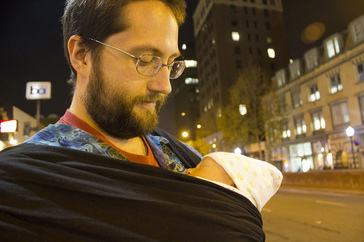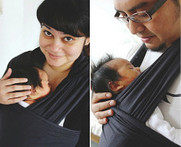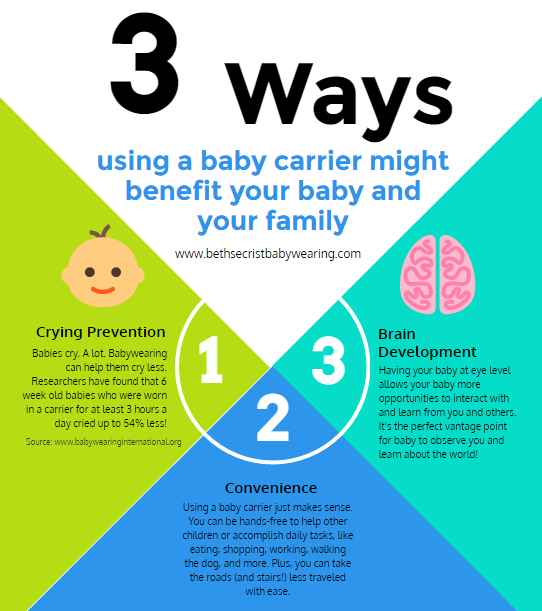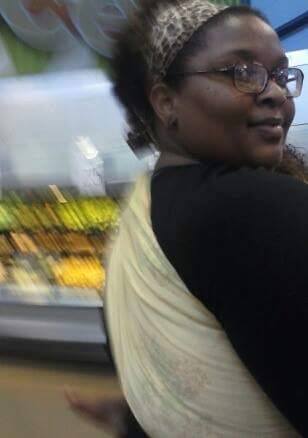|
Think about all of the benefits that babywearing brings to you, your child, and your family. The comfort, the confidence, and convenience that make life more pleasant, easier, tolerable, livable. Parents everywhere who wear their babies agree with you. Babywearing makes life better for everyone. For some mothers and babies, however, babywearing is something more. It can bring comfort, connection, and the ability to get through daily life when life is at its toughest. One tough situation that faces some families is family violence, specifically intimate partner violence. There are a range of effects on the mothers and children who survive, including physical injury, emotional trauma, cognitive distortions, complete separation from social or family support, instant and extreme financial problems, and lasting neurological effects of witnessing and experiencing trauma, especially for babies and children. Babywearing, when utilized carefully, is a tool that can assist some mothers and children who face these obstacles. One woman started listening Julia Walker is a babywearing mom who decided to do something to help moms and their children who have recently left family violence and are living in the shelter system. She had volunteered as a co-leader with her local babywearing group, and while helping members learn to wear, discovered that some were, like her, rebuilding their lives after fleeing partner violence. Word spread that she was teaching these women to use carriers, and she quickly exhausted her personal resources. She developed the organization World on My Shoulders to partner with manufacturers, community activists, and other caring individuals to collect carriers and raise funds to sustain and expand the scope of this unique project. The story of World on My Shoulders Julia graciously agreed to answer some questions about WoMS to share about the story, mission, and impact of the organization, and how you can help! Q: Can you tell us a little about what you have witnessed about how babywearing helps some moms and babies who have experienced family violence? In what ways can babywearing support some of these families? A: I experienced family violence so I will answer from the survivor perspective. Wearing helped me in several ways when I fled. I was 34 weeks pregnant and had a one year old when I was severely beaten and finally left. The incident broke my glasses and cracked my orbital and several ribs so I was unable to drive and had to wear to walk. We were both shaken so for weeks after that last attack, I was unable to put my elder child down out of fear. I had a moderate sized stash, six carriers, and the money I made reselling most of those gave me what padding I had while travelling through the shelter system on the way back to my safe place. Luckily my stays in shelter were short and I primarily happened across some very nice facilities but that isn't the reality for many and wearing can help keep children feeling safe while helping the caregiver to accomplish the daily tasks required to stay in many facilities. Q: What types of evidence-based practices do you use in working with this vulnerable population? A: My evidence based experience is lived experience, knowledge of the communities I serve, and the listening to the needs of the people I am helping. The goal is filling a void beyond shelter. By giving people a lifelong tool, an escape from their trauma, and a connection to a broader community of babywearers that has replaced the community model that has disappeared in mainstream society. Studies have concluded that babywearing can aid trauma victims by decreasing anxiety and depression for the wearer and the wearee. I have plans for continuing education that will aid me in better understanding infant development and anticipate that will help the wearers also. Q: Women and children who have experienced the trauma of family violence are often at risk for being triggered by close physical contact. What mental health professionals does WoMS consult or partner with to ensure your outreach efforts are based on trauma-informed practices? A: All of us are survivors of family violence, either as children witnessing and suffering from the effects or like myself, adult victims with children. Coupling our basic skills as babywearing educators seeking to maintain bodily autonomy for all that we help with our personal experiences within the system, we all have heightenened sensitivity to those freshly fleeing. Q: Women leaving family violence situations and living in shelters or other transitional housing often are living in very dirty conditions and with minimal or no access laundry facilities or supplies (with which to wash cloth carriers). How do you address this barrier? A: With the locales that we worked in so far, this hasn't been an issue, though I primarily ask manufacturers for the easycare items in their catalog. Soul Slings sent us some all cotton wraps and ring slings and BabyloniaUSA sent some BBTais which are extremely easy to spot clean along with BBSlens and wraps. Q: What cities or community is WoMS currently helping? Who is helping and how? A: Right now, I cover Texas, primarily the eastern portion of the state. Autumn Brundige is in SE Oklahoma and is the closest to myself. Hess Stinson is in the greater DC area and Anastasia West covers NYC, particularly the Bronx. I also have an educator in Houston, Angelique Geehan, who will be assisting with our first full sized in person class July 2016. Q: What are the "next steps" of WoMS? A: Right now I am preparing to speak about WoMS at WEAR (a babywearing conference) in Chicago in May. The class in Houston in July 2016 is next then expanding our library by purchasing from some of the companies that already donated: BabyloniaUSA and Soul Slings being priority. We are also in the process of building a webstore with homemade goods. Then, we can gather resources to help us pursue nonprofit status. Q: How can others help? What kind of support do you need to continue your mission? A: Finances are our main barrier. We need money to ship carriers to those who live far from any existing WoMS chapters. We have a paypal specifically for WoMS that is generally empty. We need supplies for our webstore, most of which can be purchased at any craft store. We all are doing this on a volunteer basis so helping us cover the costs for our continuing education would be great also. Also, WoMS is one of my jobs. Recently I started doing professional babywearing consultations in an attempt to fundraise for my family to survive and for WoMS expansion but jobs are far and few between until word of mouth spreads more. How can you help? As you prepare to celebrate Mother's Day with your babies, little and big, consider supporting the mothers and babies who are helped by World on My Shoulders, through spreading the word, sending good wishes or prayers for success, purchasing an item for sale from the webstore on the WoMS site (scheduled to open May 13th. 2016), or making a donation.  Used under the Creative Commons license through Flickr. Photography by Quinn Dombrowski Used under the Creative Commons license through Flickr. Photography by Quinn Dombrowski New parenthood is a time of huge changes! All of a sudden, you are responsible for another human life, and you may be recovering from birth, supporting a partner who is recovering from birth, or adapting to a new role as a foster or adoptive parent. Babywearing can bring benefits not only for your newest little member of the family, but also for you! Confident Parents Wearing your new baby helps you get to know him intimately. Because baby is so close to you while being worn, you grow to understand the cues he gives via movement, gesture, and facial expression. When you know and can respond quickly to his cues (before he starts to cry), he will increase his trust in you, and this builds your confidence. As this pattern happens repeatedly, your attachment to each other increases. This can be especially helpful if you are at risk for or are experiencing postpartum depression. Loving Caregivers Babywearing is not just for moms! Fathers, grandparents, babysitters, and other important adults can bond with baby through wearing. The baby gets to know each adult and their attachment deepens! Fathers and other caregivers can also benefit from the increased confidence they will have by being able to recognize and respond to baby's cues. Comfort and Convenience Babywearing can allow you the freedom to take care of older siblings, attend to household chores, work, and exercise (walking or hiking are favorites), all while keeping baby content. You can go where no stroller can go (stairs, bumpy or muddy trails, and more) and navigate crowded places (airports, festivals, family parties) with relative ease. Source  photo used under Creative Commons license. Photography by: Deepa Paul photo used under Creative Commons license. Photography by: Deepa Paul As parents, we all want the best for our children. The best start you can give your new baby is to meet her needs consistently. Babies increase their trust in us when we respond to their needs, every time. Babywearing meets so many of your baby's needs, quite easily. Babies were born to be worn! Some of the benefits that are often mentioned include: Worn babies cry less
Research has shown that babies who are worn or carried for 3 hours a day (regardless of whether they "need" to be carried) are 43% less likely to fuss or cry than babies who were not carried as much. They were over 50% less likely to cry during the evening hours, which are often known as the "witching hours" for babies. Worn babies learn more Less crying means more time for learning! Worn babies spend more time in the "quiet alert" state, in which they are content and most able to learn from and interact with their environment, The baby can study his mother or father's face, increasing bonding, and also the world around them. Worn babies are more organized Babies need some extra time after they are born to develop their ability to regulate their systems. In the womb, they are in tune with the mother, and once they leave the womb, they benefit from being worn or carried by being close enough to hear or feel their mother's heartbeat, breathing, temperature, and movement. These rhythms continue to calm and regulate baby for months after birth. Worn babies are part of their world Babywearing helps the infant's brain to make healthy connections by ensuring the baby is exposed to and participating in the mother or father's chosen stimuli and is protected from overstimulation. The baby spends time in the caregiver's world (everyday chores and errands, outdoor adventures) and is learning every moment during this time. Worn babies also tend to have enhanced attention to and engagement in conversations, as they pick up the rhythms of human communication and learn to listen and to communicate pre-verbally and verbally. These are just some of the many reasons to wear your baby. Every baby and every family is different, and you will find many more of your own to add to this list! Source |
AuthorBeth. The babywearing lady. Archives
May 2017
Categories
All
all content
copyright 2016 Beth Secrist All photos used under the Creative Commons license through Flickr. Photography by: littletuesday12 |


 RSS Feed
RSS Feed